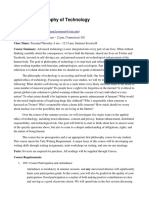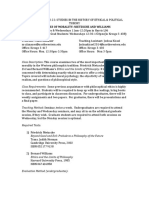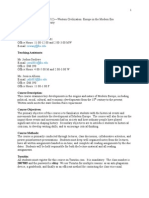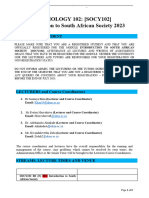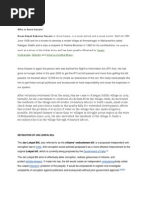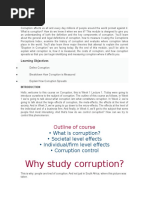0 ratings0% found this document useful (0 votes)
197 viewsPHIL 27 - Syllabus
PHIL 27 - Syllabus
Uploaded by
Montblanc33This document provides an overview of the PHIL 27: Ethics & Society course for UCSD's Summer Session 1 2014. The course will be taught by Professor Gerald Doppelt on Mondays and Wednesdays from 11:00-12:50 pm. It will cover ethics topics including abortion, gender stereotypes, and reverse discrimination over 5 weeks. Students will write two papers, take a midterm exam, and participate in lectures and sections to receive their grade. The course reader and Ehrenreich's book are required texts. The syllabus outlines weekly readings, assignments, and exam dates. Grades will be based on papers, exams, attendance, and quizzes. Students must complete all assignments to pass
Copyright:
© All Rights Reserved
Available Formats
Download as DOC, PDF, TXT or read online from Scribd
PHIL 27 - Syllabus
PHIL 27 - Syllabus
Uploaded by
Montblanc330 ratings0% found this document useful (0 votes)
197 views3 pagesThis document provides an overview of the PHIL 27: Ethics & Society course for UCSD's Summer Session 1 2014. The course will be taught by Professor Gerald Doppelt on Mondays and Wednesdays from 11:00-12:50 pm. It will cover ethics topics including abortion, gender stereotypes, and reverse discrimination over 5 weeks. Students will write two papers, take a midterm exam, and participate in lectures and sections to receive their grade. The course reader and Ehrenreich's book are required texts. The syllabus outlines weekly readings, assignments, and exam dates. Grades will be based on papers, exams, attendance, and quizzes. Students must complete all assignments to pass
Original Description:
Syllabus for Phil 27
Copyright
© © All Rights Reserved
Available Formats
DOC, PDF, TXT or read online from Scribd
Share this document
Did you find this document useful?
Is this content inappropriate?
This document provides an overview of the PHIL 27: Ethics & Society course for UCSD's Summer Session 1 2014. The course will be taught by Professor Gerald Doppelt on Mondays and Wednesdays from 11:00-12:50 pm. It will cover ethics topics including abortion, gender stereotypes, and reverse discrimination over 5 weeks. Students will write two papers, take a midterm exam, and participate in lectures and sections to receive their grade. The course reader and Ehrenreich's book are required texts. The syllabus outlines weekly readings, assignments, and exam dates. Grades will be based on papers, exams, attendance, and quizzes. Students must complete all assignments to pass
Copyright:
© All Rights Reserved
Available Formats
Download as DOC, PDF, TXT or read online from Scribd
Download as doc, pdf, or txt
0 ratings0% found this document useful (0 votes)
197 views3 pagesPHIL 27 - Syllabus
PHIL 27 - Syllabus
Uploaded by
Montblanc33This document provides an overview of the PHIL 27: Ethics & Society course for UCSD's Summer Session 1 2014. The course will be taught by Professor Gerald Doppelt on Mondays and Wednesdays from 11:00-12:50 pm. It will cover ethics topics including abortion, gender stereotypes, and reverse discrimination over 5 weeks. Students will write two papers, take a midterm exam, and participate in lectures and sections to receive their grade. The course reader and Ehrenreich's book are required texts. The syllabus outlines weekly readings, assignments, and exam dates. Grades will be based on papers, exams, attendance, and quizzes. Students must complete all assignments to pass
Copyright:
© All Rights Reserved
Available Formats
Download as DOC, PDF, TXT or read online from Scribd
Download as doc, pdf, or txt
You are on page 1of 3
PHIL 27: Ethics & Society UCSD Summer Session 1 2014
Professor Gerald Doppelt Center 115 MW 11:00-12:50 pm
TAs :
Erik Olson (eolson@ucsd.edu)
J.P. Messina (jamessina@ucsd.edu)
Danny Weltman (dweltman@ucsd.edu)
Required Texts: Copies of the Course Reader and Ehrenreichs book will be on reserve in Geisel library.
1) Cal Copy PHIL 27 Summer 2014 Reader (henceforth CC).
**Note: All papers require citations from the Cal Copy Summer 2014 Reader**
The course reader is available at Cal Copy (858-452-9949), 3251 Holiday Court 1!3 (by "o#i$o%s &i''a)(
2) The Hearts of Men by B. Ehrenreich, available at the University Bookstore.
Course Website: The course website can be found at TED (http://ted.ucsd.edu). There, you can find the course
syllabus, paper topics, exam study questions, the grading code, and TurnItIn.Com links.
Course Schedule (no extensions, late papers, or incompletes):
Week 1 First Paper Topic handed out in Monday lecture
Week 2 Midterm Study Guide handed out in Monday lecture
First Paper Topic due Wednesday before lecture
Week 3 Second Paper Topic handed out in Monday lecture
Midterm Exam to be held during Wednesday SECTION
Week 4 Second Paper Topic due Wednesday before lecture
Week 5 Course wrap-up, no final exam
Course Outline:
Week 1 The Ethics of Abortion
1) Abortion, Bass (CC)
2) A Defense of Abortion, Thomson (CC)
First Paper Topic: Handed out in Monday lecture
3) How to Argue about Abortion, Noonan (CC)
4) Should a Fetus Have Rights?: How Science is Changing the Debate, Newsweek
(CC)
5) Matters of Life and Death, Glover (CC)
6) Abortion & the Politics of Motherhood, Luker, Chp. 7 (CC)
Week 2 The Ethics of Gender Stereotypes (Part 1)
1) The Hearts of Men, p. 1-182 (Ehrenreich)
2) She Works, He Doesnt, Newsweek (CC)
Midterm Study Guide: Handed out in Monday lecture
First Paper Topic: Due Wednesday before lecture
3) On Psychological Oppression, Bartky (CC)
4) Misdiagnosing the Mind, Tavris (CC)
5) Killing Us Softly Volume 3 (UCSD Film Reserves)
Week 3 The Ethics of Gender Stereotypes (Part 2)
Monday:
1) Career Obstacles in Medicine, Reed (CC)
2) The Rape of Petty Officer Blumer: Inside the militarys culture of sex abuse, denial
and cover up, Erdeley (CC)
3) Sexual Assault in Military Jaw-dropping, CNN (CC)
4) A Womans Place, Auletta (CC)
5) Altruism and Womens Oppression, Blum (CC)
Second Paper Topic: Handed out in Monday lecture
The Ethics of Reverse Discrimination (Part 1)
Wednesday:
Midterm Exam: Wednesday IN SECTION
6) The Justification of Reverse Discrimination in Hiring, Beauchamp (CC)
7) U.S. Supreme Court, University of California vs. Bakke, (CC)
8) Reverse Discrimination and Compensatory Justice, Blackstone (CC)
9) Reverse Discrimination: A Brief Against It, Van den Haag (CC)
Week 4 The Ethics of Reverse Discrimination (Part 2)
Monday:
1) What People Deserve, Rachels (CC)
2) Reversing the Arguments Against Reverse Discrimination, Humber (CC)
Ethics in Business and Bureaucratic Organizations
Wednesday:
Second Paper Topic: Due Wednesday before lecture
3) Morality and the Ideal of Rationality in Formal Organizations, Ladd (CC)
4) Ladd on Morality and Formal Organizations, Long and Snoeyenbos (CC)
Week 5 Ethics in Professions
1) Case: Organizational Decision-Making at Aero Products, (CC)
2) Case: Cost-Benefit Analysis and the Ford Pinto, (CC)
3) On Being a Professional, Morally Speaking, Camenish (CC)
4) Calling or Career: The Tensions of Modern Professional Life, Sullivan (CC)
Course Requirements: Grades will be based on the following:
First paper...35%
Midterm exam.....20%
Second Paper...35%
Attendance in lectures/sections, quiz grades, participation.....10%
**Note: 10% of your grade is allocated as follows: You lose two points for every lecture or section in which you are
absent. Otherwise, the number of points you get out of this 10% will depend on your performance on quizzes in
section and lecture, and participation in section.
Grading Procedure:
Your papers/exams should have comments by your TA at the end of the paper indicating its strengths and
weaknesses. Please read these comments carefully, as well as the other comments dispersed throughout your paper,
in order to understand the overall evaluation and grade given to your paper/exam. If you desire a better
understanding of the evaluation of your work, follow the instructions below:
1) Please carefully re-read the questions asked in all parts of your paper or exam topics. Thoroughly check to
determine if your paper/exam clearly answers each question and part of the topic. One reason for a lower
grade on paper/exams is that the student has not provided a clear answer for each answer and part of the
topics of the paper/exam.
2) After you have carefully re-read the comments of your TA, if you do not understand them, make an
appointment with your TA to discuss the comments or evaluation. Do your best to appreciate the standards
we are using to make the most of your abilities.
3) All in all, students work improves when they seek to understand the strengths and weaknesses of their
work. On the other hand, trying to renegotiate a grade is usually counterproductive and fruitless.
Final Grade:
Students must complete the papers and all exams to pass the course. In addition to submitting the papers in
hard-copy form, it must also be submitted to TurnItIn through the course TED (http://ted.ucsd.edu). To
turn in your papers, click on the TurnItIn icon for the appropriate assignment, and follow the instructions
given. UCSD has a university-wide Policy on Integrity of Scholarship, published annually in the Catalog
(pp. 62-64 for 2002-3), online at http://registrar.ucsd.edu/records/grdbk3.html. All students must read and
be familiar with this Policy. Receipt of this syllabus constitutes an acknowledgment that you are
responsible for understanding and acting in accordance with UCSD guidelines on academic integrity.
Lectures Office Hours: Doppelt by appointment (jdoppelt@ucsd.edu)
You might also like
- Full Political Science An Introduction Michael G. Roskin Ebook All ChaptersDocument49 pagesFull Political Science An Introduction Michael G. Roskin Ebook All ChaptersmosiheazzaamNo ratings yet
- SyllabusDocument8 pagesSyllabusrickyangnwNo ratings yet
- PHIL S183 - Philosophy of TechnologyDocument5 pagesPHIL S183 - Philosophy of TechnologyJakub Albert FerencNo ratings yet
- Dwaring@yorku - Ca: Internet Encyclopedia of Philosophy Are Excellent, Peer-Reviewed Sources That Contain Articles byDocument9 pagesDwaring@yorku - Ca: Internet Encyclopedia of Philosophy Are Excellent, Peer-Reviewed Sources That Contain Articles byZsadist20No ratings yet
- Ant 215 Syllabus 2018 WinterDocument4 pagesAnt 215 Syllabus 2018 WinterJack SidnellNo ratings yet
- Ece 35 Practice Final ADocument11 pagesEce 35 Practice Final AMontblanc33No ratings yet
- SOC SCI 103 ContemporaryDocument63 pagesSOC SCI 103 Contemporarykyleeawakan100% (1)
- Form - XVI Muster RollDocument2 pagesForm - XVI Muster RollRajapandian90% (10)
- Phil 107 Fall 2013 Moore-2Document6 pagesPhil 107 Fall 2013 Moore-2Austin McEverNo ratings yet
- UT Dallas Syllabus For Huma1301.004.11s Taught by Peter Ingrao (Jingrao)Document10 pagesUT Dallas Syllabus For Huma1301.004.11s Taught by Peter Ingrao (Jingrao)UT Dallas Provost's Technology GroupNo ratings yet
- 101 Jenkins SyllabusDocument7 pages101 Jenkins SyllabusRaphia MallickNo ratings yet
- Con_Soc_TheDocument5 pagesCon_Soc_Thehanan jeeNo ratings yet
- Syllabus Understanding Societies Fall 2015 1Document6 pagesSyllabus Understanding Societies Fall 2015 1XJYWwzlNo ratings yet
- ANT 201.3678.spring2010Document4 pagesANT 201.3678.spring2010Ismael García ColónNo ratings yet
- UT Dallas Syllabus For Crim3320.001.10s Taught by (rmg075000)Document11 pagesUT Dallas Syllabus For Crim3320.001.10s Taught by (rmg075000)UT Dallas Provost's Technology GroupNo ratings yet
- PHIL 342 Syllabus Bioethics F21 v1Document18 pagesPHIL 342 Syllabus Bioethics F21 v1Dr. philemon mwongeraNo ratings yet
- 663Engelman1516FDocument15 pages663Engelman1516FzamirNo ratings yet
- Syllabus Introduction To SociologyDocument4 pagesSyllabus Introduction To SociologyJena CollinsNo ratings yet
- Curso Medicine, 1780-1914Document22 pagesCurso Medicine, 1780-1914satuple66No ratings yet
- Vandeneykelsummeriitheo 1001 Syllabus 06282013Document4 pagesVandeneykelsummeriitheo 1001 Syllabus 06282013api-246276334No ratings yet
- AL 102 Course Guide, Spring 2021Document33 pagesAL 102 Course Guide, Spring 2021Alvin DandeeboNo ratings yet
- PHIL 1005 - Scientific Reasoning: Fall 2018 (Class # 32327/32328) V General InformationDocument9 pagesPHIL 1005 - Scientific Reasoning: Fall 2018 (Class # 32327/32328) V General InformationJCNo ratings yet
- Dr. John DePoe SYLLABUS - PHIL - REL - Fall2011 PDFDocument4 pagesDr. John DePoe SYLLABUS - PHIL - REL - Fall2011 PDFSyëd KhānNo ratings yet
- NASX 105 02 Spring 2015 SyllabusDocument6 pagesNASX 105 02 Spring 2015 SyllabusMerrillLeeRasmussenNo ratings yet
- SYLLABUS- SOC150H1S - WINTER 2025 - SCHIEMAN-FINAL V1Document9 pagesSYLLABUS- SOC150H1S - WINTER 2025 - SCHIEMAN-FINAL V1alham.maqsudiNo ratings yet
- Introduction To Sociology SyllabusDocument8 pagesIntroduction To Sociology SyllabusWendy M. Christensen, Ph.D.No ratings yet
- Anth105 SUFA 07 ObjectivesDocument20 pagesAnth105 SUFA 07 ObjectivesJose GarciaNo ratings yet
- Critiques of Morality: Nietzsche and Bernard WilliamsDocument4 pagesCritiques of Morality: Nietzsche and Bernard WilliamsMark AlznauerNo ratings yet
- f16 - Anth Soc 301a Environmental Sociology - KanDocument7 pagesf16 - Anth Soc 301a Environmental Sociology - KanNowrin MohineeNo ratings yet
- Epistemology Syllabus HarvardDocument5 pagesEpistemology Syllabus Harvardpaula zorziNo ratings yet
- Media_LawDocument6 pagesMedia_LawciyawgiiNo ratings yet
- RLG100H World ReligionsDocument6 pagesRLG100H World Religionsleif.dylanNo ratings yet
- Syllabus: Tmyint@carleton - EduDocument12 pagesSyllabus: Tmyint@carleton - EduAlexandra Jima GonzálezNo ratings yet
- SOC251H1S-Joseph-BryantDocument4 pagesSOC251H1S-Joseph-Bryanthanan jeeNo ratings yet
- Central Michigan University Death and Dying SyllabusDocument9 pagesCentral Michigan University Death and Dying SyllabuscaiagykuajynbfixzyNo ratings yet
- Rel of Ancient Greece Cla 303Document3 pagesRel of Ancient Greece Cla 303Big ChairNo ratings yet
- SyllabusDocument5 pagesSyllabusMatthew StewartNo ratings yet
- Gov Syllabus 2018-19 UT AustinDocument6 pagesGov Syllabus 2018-19 UT AustinTrevor FuNo ratings yet
- Complex Social Systems SyllabusDocument6 pagesComplex Social Systems SyllabusBenjamin HorvathNo ratings yet
- MUMH 3510 Fall Blended Syllabus-2 PDFDocument12 pagesMUMH 3510 Fall Blended Syllabus-2 PDFMatthewNo ratings yet
- Philosophy of Science 1 Course GuideDocument8 pagesPhilosophy of Science 1 Course Guideendale gebregzabherNo ratings yet
- Spring Phil 1000-018Document6 pagesSpring Phil 1000-018api-355057529No ratings yet
- IR Theory - KrebsDocument29 pagesIR Theory - Krebsillosopher94No ratings yet
- Introduction To China SyllabusDocument4 pagesIntroduction To China SyllabusCarl WeinfieldNo ratings yet
- Honors Introduction To Religious StudiesDocument7 pagesHonors Introduction To Religious StudiesmichaeljaltmanNo ratings yet
- STS SyllabusDocument12 pagesSTS SyllabusStephanie Ann Marie Dueñas100% (5)
- EUH 2030 Fall 09 SyllabusDocument7 pagesEUH 2030 Fall 09 SyllabusJeremy RowanNo ratings yet
- COMMUNICATION 140: Communication Theory: Course Description. Examination of The Major Theories On TheDocument4 pagesCOMMUNICATION 140: Communication Theory: Course Description. Examination of The Major Theories On TheAnna Katrine VitorNo ratings yet
- SOCB54 Syllabus Winter 2013Document8 pagesSOCB54 Syllabus Winter 2013longjohnsonNo ratings yet
- World History 2 DCCDocument4 pagesWorld History 2 DCCJim BobNo ratings yet
- ANE 10W Syllabus Smoak (Fall 2012)Document16 pagesANE 10W Syllabus Smoak (Fall 2012)marshaaaasNo ratings yet
- Mitchell - Sellers@colostate - Edu: Course Description and ObjectivesDocument10 pagesMitchell - Sellers@colostate - Edu: Course Description and Objectivesジョ-ジNo ratings yet
- SOC 4233 - Fry - Criminology Spring 2024 Course SyllabusDocument11 pagesSOC 4233 - Fry - Criminology Spring 2024 Course SyllabusSarah FryNo ratings yet
- 330 Syllabus PDFDocument4 pages330 Syllabus PDFBob JonesNo ratings yet
- Cultural Studies SyllabusDocument5 pagesCultural Studies SyllabusJonathan Frank McMillanNo ratings yet
- Sociology 102Document8 pagesSociology 102anicktumuNo ratings yet
- UT Dallas Syllabus For cs5349.001.09s Taught by Dung Huynh (Huynh)Document5 pagesUT Dallas Syllabus For cs5349.001.09s Taught by Dung Huynh (Huynh)UT Dallas Provost's Technology GroupNo ratings yet
- Ee339 Course Syllabus-Fall 2018Document6 pagesEe339 Course Syllabus-Fall 2018Alejandro PuceiroNo ratings yet
- UT Dallas Syllabus For Lit3312.001 06f Taught by Scott Herndon (sxh021200)Document13 pagesUT Dallas Syllabus For Lit3312.001 06f Taught by Scott Herndon (sxh021200)UT Dallas Provost's Technology GroupNo ratings yet
- Uncovering Student Ideas in Science, Volume 1: 25 Formative Assessment ProbesFrom EverandUncovering Student Ideas in Science, Volume 1: 25 Formative Assessment ProbesNo ratings yet
- Developing Research Project Skills with Children: An Educator's HandbookFrom EverandDeveloping Research Project Skills with Children: An Educator's HandbookNo ratings yet
- Working with Problem Faculty: A Six-Step Guide for Department ChairsFrom EverandWorking with Problem Faculty: A Six-Step Guide for Department ChairsNo ratings yet
- Strategies for Success on the Sat: Critical Reading & Writing Sections: Secrets, Tips and Techniques for Conquering the Sat from a Test Prep ExpertFrom EverandStrategies for Success on the Sat: Critical Reading & Writing Sections: Secrets, Tips and Techniques for Conquering the Sat from a Test Prep ExpertNo ratings yet
- First Aste of Contract: Design BDocument15 pagesFirst Aste of Contract: Design BMontblanc33No ratings yet
- 2014 Easton Target Arrow Selection Chart-WhiteDocument3 pages2014 Easton Target Arrow Selection Chart-WhiteMontblanc33No ratings yet
- Formation of Molecular Orbitals From Atomic Orbitals in Homonuclear MoleculesDocument2 pagesFormation of Molecular Orbitals From Atomic Orbitals in Homonuclear MoleculesMontblanc33No ratings yet
- Essay Admission BADDocument4 pagesEssay Admission BADDeborahNo ratings yet
- Viva Voce: Division of The House Nominal VotingDocument3 pagesViva Voce: Division of The House Nominal VotingEmma SchultzNo ratings yet
- Katitikan NG Pulong - Group5Document2 pagesKatitikan NG Pulong - Group5mima.mendoza.cocNo ratings yet
- Assignment On Jan Lokpal BillDocument11 pagesAssignment On Jan Lokpal BillKritika Singh0% (1)
- Iroquois ConfederacyDocument12 pagesIroquois ConfederacyrideauparkNo ratings yet
- United States District Court District of New Jersey: Criminal ComplaintDocument7 pagesUnited States District Court District of New Jersey: Criminal ComplaintSHIFrankelNo ratings yet
- Painter - Benjamin Pap Singleton and Migration To KansasDocument6 pagesPainter - Benjamin Pap Singleton and Migration To Kansasjstoneyy100% (1)
- Relationship Between Language and SocietyDocument7 pagesRelationship Between Language and SocietyM.ZubairNo ratings yet
- Indian Coal Allocation ScamDocument21 pagesIndian Coal Allocation ScamMahek BansalNo ratings yet
- Bergonia V CADocument2 pagesBergonia V CAPierre MacalinoNo ratings yet
- Prediction India Election 2019Document17 pagesPrediction India Election 2019rahulvhiremathNo ratings yet
- Week 1 What Is CorruptionDocument15 pagesWeek 1 What Is CorruptionAlba P. RomeroNo ratings yet
- Council of Europe Language Education Policy ProfileDocument61 pagesCouncil of Europe Language Education Policy ProfileEvelina TutlyteNo ratings yet
- A State As A Subject of International LawDocument15 pagesA State As A Subject of International Lawsreedevi sureshNo ratings yet
- LMPC Minutes 12-15-23Document3 pagesLMPC Minutes 12-15-23Kevin Avalon YapNo ratings yet
- Napoleon EmpireDocument2 pagesNapoleon EmpireRosemary714No ratings yet
- CSI - Egyptian Tea Garden.Document2 pagesCSI - Egyptian Tea Garden.RodrigoTaipe93No ratings yet
- Empowering Women Through Microfinance: Susy Cheston and Lisa KuhnDocument5 pagesEmpowering Women Through Microfinance: Susy Cheston and Lisa KuhnCharu ModiNo ratings yet
- Unity DayDocument2 pagesUnity DaySunny SinghNo ratings yet
- 6 To 8 Trening Batch 2Document3 pages6 To 8 Trening Batch 2shrimaa.207No ratings yet
- Sukhmanpreet SinghDocument13 pagesSukhmanpreet Singhrachhpal singhNo ratings yet
- Russia UNSC Position PaperDocument3 pagesRussia UNSC Position PaperSukhanAtwal100% (1)
- 08-27-13 EditionDocument28 pages08-27-13 EditionSan Mateo Daily JournalNo ratings yet
- Secdocument 8524Document67 pagesSecdocument 8524mike.mason147No ratings yet
- National Planning Commission Act 15 of 1994Document4 pagesNational Planning Commission Act 15 of 1994André Le RouxNo ratings yet
- Answer Key - 2021 - History - Art & Culture - Pratik NayakDocument30 pagesAnswer Key - 2021 - History - Art & Culture - Pratik Nayaklipsa jenaNo ratings yet
- Casanovas Vs Hord DigestDocument2 pagesCasanovas Vs Hord DigestSaab Abelita100% (3)


